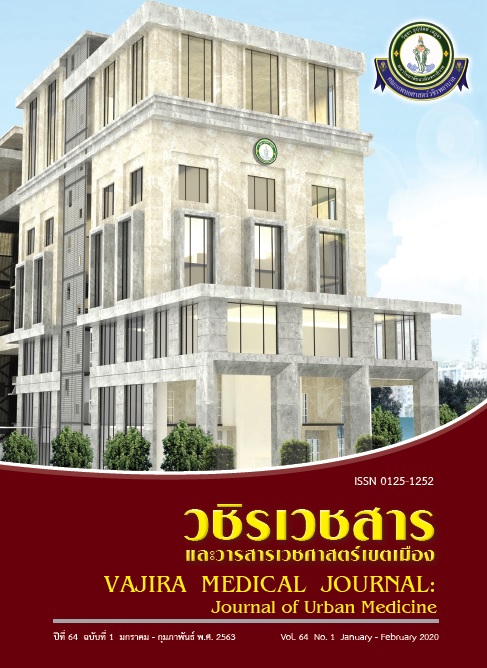The follow-study of Thai Family Care Team project implementation in Bangkok Metropolitan Administration
Main Article Content
Abstract
This research aimed to examine perception towards Family Care Team project of disabled, elderly, chronic and palliative care patients in Bangkok; and to explore Family Care Team operations in Bangkok. Research population were disabled, elderly, chronic and palliative care patients living in Bangkok. A sample of 374 cases living in Taling Chan district, Ladphrao district, Bangplad district, Dusit district, Thonburi district and Bang Sue district were selected to the study. Research tools comprised a questionnaire of perception towards Family Care Team project and a questionnaire of operation performance in accordance with Family Care Team criteria adapted from a questionnaire created by Prof.Dr.Paiboon Suriyawongpaisan and staff (2015) used in the study of Assessment of health policy on promoting family care team with Cronbach’s alpha coefficient reliability at 0.78. Statistics used to analyze the data were frequency, percentage, mean, and standard deviation. The results of the study were as follows.
1. Perception towards Family Care Team project of disabled, elderly, chronic and palliative care patients in Bangkok revealed that 63.6% of samples received information about Family Care Team from Health team, 20.1% of samples knew name of doctors of Family Care Team, and 5.6% of samples knew telephone numbers of doctors of Family Care Team.
2. Operation performance of Bangkok Family Care Team resulted as follows. 1) For service access, 93.3% of samples found it was convenient to receive healthcare service at the public health center they regularly visited, 58.8% of samples indicated the public health center they regularly visited provided parttime clinic, and 50% of samples were able to contact Family Care Team for their health problem. 2) For disease prevention, 50-80% of samples received information about disease prevention and healthcare in all aspects, 35% of samples were informed about cancer screening and 42% of samples received flu vaccine. 3) For disease screening, most samples received healthcare services to measure their blood pressure measurement 70-90%, weight, blood glucose and blood cholesterol. 4) For data access and care coordination, 85.6% of samples found that it was convenient to seek for data file as well as samples were able to see personal file and asked for a copy of their examination records when they needed (26.2% and 20.6% respectively). Moreover, 28.3% of samples were helped with appointment and transfer for specialist visits and 24.9% of samples indicated that their specialist doctor visits were monitored. 5) For patient-centered care services, most samples showed their opinions were respectful and they got detail explanation for their doubts (92% and 90.2% respectively) whereas 31.3% of samples got a home-visit. 6) For self-care supporting system, samples revealed that Family Care Team provided ongoing follow-up appointment and explained about complications, diseases, how to conduct home self-care, treatment options, in addition, they invited them to join health promotion activities (65.5-71.1%). Also, 59.4% of samples indicated that Family Care Team visited their house to give advice and help.
Downloads
Article Details
References
World Health Organization. What are the advantages and disadvantages of restructuring a health care system to be more focused onprimary care services?. [internet]. 2004 [cited 2016 March 9]. Available from: http://www.euro.who.int/__data/assets/pdf_file/0004/74704/E82997.pdf
Constitution of the kingdom of Thailand [internet]. 2560 [cited 2017 May 7]. Available from: URL: http://www.ratchakitcha.soc.go.th/DATA/PDF/2560/A/040/1.PDF.
Jerant A J, Fenton J., Franks P. Primary care attributes and mortality: a national person-level study.The Annals of Family Medicine. 2012; 1:34-41.
Wang W., et al. Contribution of primary care to health: an individual level analysis from Tibet, China. International journal for equity in health.2015; 1: p. 107-119.
Bureau of policy and strategy. (draft) Strategy for primary care network development Support the Constitution of the kingdom of Thailand B.E.2016 (B.E. 2017-2026) [internet]. 2014 [cited 2017 March 7]. Available from: URL: http://bps.moph.go.th/new_bps/sites/default/files/PCCedit8-9-59.pdf
Strategy and Evaluation department. Bangkok statistics book [internet]. 2014 [cited 2016 March 7] Available from: URL: http://www.bangkok.go.th/upload/user/00000052/stat2557(thai).pdf
BMA data center. Integrate cooperation with the Bureau of Medicine and the Bureau of Health and Public Health to cover and closely [internet]. 2018 [cited 2019 May 21] Available from: http://www.prbangkok.com/th/board/view/MDY1cDBzNnM0NHIyb3Ezc3E2NnEyNDk0cDRyOTQzcjQ4NzY2
Suriyawongpaisal P, et.al. Follow up on family doctor team policy evaluation; Full research paper. [internet]. Bangkok: Health systems research institute. 2015 [cited 2017 Feb 23]. Available from: https://www.hsri.or.th/sites/default/files/attachment/familycareteam_full_report_hsri.pdf
Srivanichakorn S, Yana T, Bookboon P, Tragoolvongse P. The situation and opinion on family care team policy. [internet]. Bangkok: Health systems research institute; 2015 [cited 2017 Feb 23]. Available from: https://www.hsri.or.th/researcher/research/new-release/detail/6158
Srivichai W. Survey of health provision by primary care cluster in Tak Province: Expectation, utilization of health service, and satisfaction of the target patients and caregivers. BJM Vol.5 No.1 January-June 2018:64-82.
Maeng, DD, Graham, J, Graf, TR, Liberman, JN, Dermes, NB, Tomcavage, J., … Steele, G. D., Jr. Reducing long-term cost by transforming primary care: evidence from Geisinger’s medical home model. The American Journal of Managed Care. 2012; 3: 149–155 [internet]. [cited 2016 March 9]. Available from: https://search.ebscohost.com/login.aspx?direct=true&db=mdc&AN=22435908&site=ehost-live.
Department of health service support. Primary care network quality criteria. [internet]. Bangkok: National office of buddhism. Strategy and evaluation department; 2014 [cited 2016 Feb 12]. Available from: http://www.bangkok.go.th/upload/user/00000130/Logo/statistic/stat%202556 (thai).pdf
Tetjativaddhana P. Review for further development of the Family Care Team policy. [internet]. Bangkok: Health systems research institute; 2017 [cited 2018 Nov 28]. Available from: https://www.hsri.or.th/researcher/media/news/detail/91554
Nation Health Security Office Metropolitan area 13. Manual of promotion and prevention (P&P) Metropolitan area fiscal year 2018[internet]. 2017 [cited 2018 Feb 2]. Available from: https://bkk.nhso.go.th/fy61starter/manual3.pdf
Thai Health Promotion Foundation. Advises the elderly to vaccinate with influenza to prevent complications [internet]. 2019 [cited 2018 Feb 26]. Available from: https://www.thaihealth.or.th/Content/48910.html
Orapin K. Screening for disease. Phitsanulok: Faculty of Public Health Naresuan University;2014.
The working group created a referral system operation manual of hospitals under the Medical Department. Manual of referral patient [internet]. Bangkok: Medical Service Department; 2018 [cited 2019 March 8]. Available from: http://www.msdbangkok.go.th/download%20manual%20work.html
Health Administration Division Ministry of Public Health. Family care team. Bangkok: The Agriculture Co-operative Federation of Thailand; 2014.
Serirat S. Consumer behavior. 1stedition. Bangkok: Diamond in Business World; 2014.


